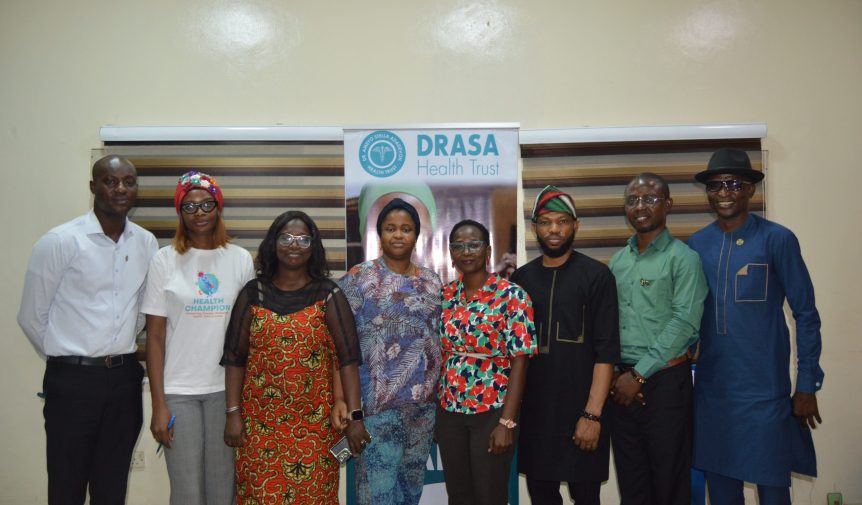“Primary Healthcare Centres are the frontlines of the health system. When they are strong, communities are healthy.” — Dr. Matshidiso Moeti, WHO Regional Director for Africa
Healthcare centers serve as vital support systems for community members, allowing them to express their health concerns and receive prompt solutions. However, when these healthcare workers in these facilities do not practice robust infection prevention and control (IPC) measures like hand hygiene, proper waste segregation and disposal, as well as strategic cleaning and sanitation of the premises, germs pose risks to patients and can leave them with illnesses that they acquire during their visit. These are called healthcare-associated infections (HAIs), and they occur when these centers fail to implement standard infection prevention and control (IPC) measures in their patient care practices.
We conducted visits to seven Primary Healthcare Centers (PHCs) across three Local Government Areas in Lagos State: Badagry, Ikorodu, and Ibeju-Lekki, to enhance their knowledge and capacity regarding HAIs and how they can proactively control the spread of diseases through effective IPC practices.
We provided education on several important topics, including hand hygiene, the proper techniques for donning and doffing gloves, respiratory etiquette, the segregation and management of hospital waste, and best practices for cleaning, disinfection, and sterilization. The training targeted not only clinical staff but also non-clinical staff (cleaning personnel), ensuring that everyone contributes to maintaining optimal hygiene and safety within the healthcare facility.
We further connected the Officers-in-Charge (OiCs) of each PHC and the Medical Officers of Health in each LGA with government authorities at the Lagos State Primary Healthcare Board (LSPHCB) through a Dissemination Meeting, while also providing technical support to the seven PHCs, carefully monitoring and following up on their efforts to improve IPC in their facilities through supervisory visits.

Primary Healthcare Training Dissemination Meeting
To strengthen the connection between grassroots healthcare development and key stakeholders in the government, we organized a dissemination meeting with representatives from the Lagos State Primary Healthcare Board (LSPHCB) to present our findings. We outlined the current state of IPC practices in the PHCs and shared the challenges we witnessed as well as the gaps we identified. To allow each PHC to address these gaps and tailor solutions to their unique challenges, the Officers-in-Charge (OiCs) developed an Action Plan document with DRASA providing the necessary technical support.

The Action Plan is a strategic document that details the health facility gaps identified from our findings during the initial implementation. It was shared with the seven Officers-in-Charge (OiCs) to propose actionable steps they can take to address these gaps and enhance IPC practices in their facilities. The OiCs, along with their respective Medical Officers of Health (MOHs), were grouped by their Local Government Areas (LGAs) to brainstorm potential solutions that can be implemented to improve IPC practices. After the brainstorming sessions, each PHC presented its unique challenges and proposed to the government stakeholders in attendance significant actionable steps that they would take to address the identified gaps.

Following the dissemination meeting, we established a communication platform to foster ongoing engagement, active IPC knowledge sharing, and collaboration among the OiCs, Facility IPC Focal Persons, MOHs, and the government stakeholders from the Lagos State Primary Health Care Board (LSPHCB). This platform is bringing grassroots healthcare closer to government stakeholders and strengthening relationships within government and primary healthcare.

Supervisory Visits and National Scorecard Support
After the dissemination meeting, we conducted a supervisory visit to each facility to follow up on the actionable steps outlined in their respective Action Plans. During these visits, we reviewed the progress of the action plans and analyzed their outcomes, providing insights into areas that required support and improvement.
To further strengthen IPC best practices, we conducted a virtual meeting and provided a detailed explanation of the National IPC Scorecard for the Officers-in-Charge (OiC) and IPC Focal Persons at each facility. This deepened their understanding of IPC and the use of the National IPC scorecard, and encouraged the IPC focal persons to routinely monitor and enhance IPC practices at their facilities.
To showcase how our engagement is being put to action, the IPC focal person at the Emmanuel Osinowo Children Centre (EOCC), Ikorodu, shared that she and her Officer-in-Charge launched a new initiative in April 2025 where they now start each day with a brief discussion on standard IPC precautions and healthcare waste management following routine observations of poor waste management in their facility.
Primary Healthcare Centres are the bedrock of community health, and their ability to deliver safe, quality care is non-negotiable. Through targeted training, strategic partnerships, and ongoing support, we will continue to equip health workers with the knowledge and tools they need to keep themselves and their patients safe. From educational sessions to collaborative action planning and supervisory follow-ups, we have seen firsthand the impact of prioritizing patient safety at the grassroots level.
As we continue to build capacity and foster connections between frontline health workers and policymakers, we move closer to achieving a point where safety, hygiene, and accountability are the norm, and not just actions taken in times of health emergencies or outbreaks.




